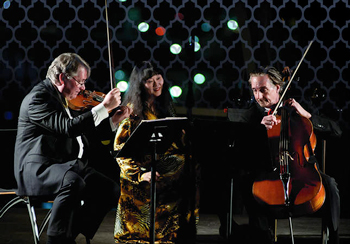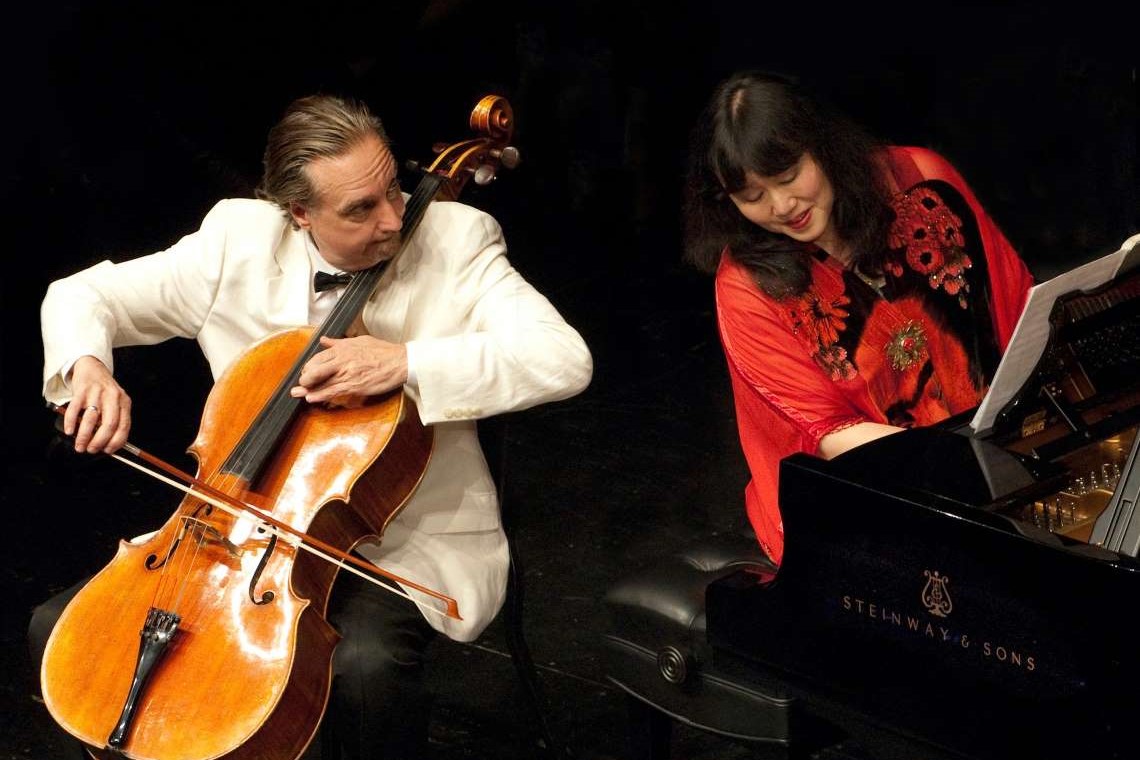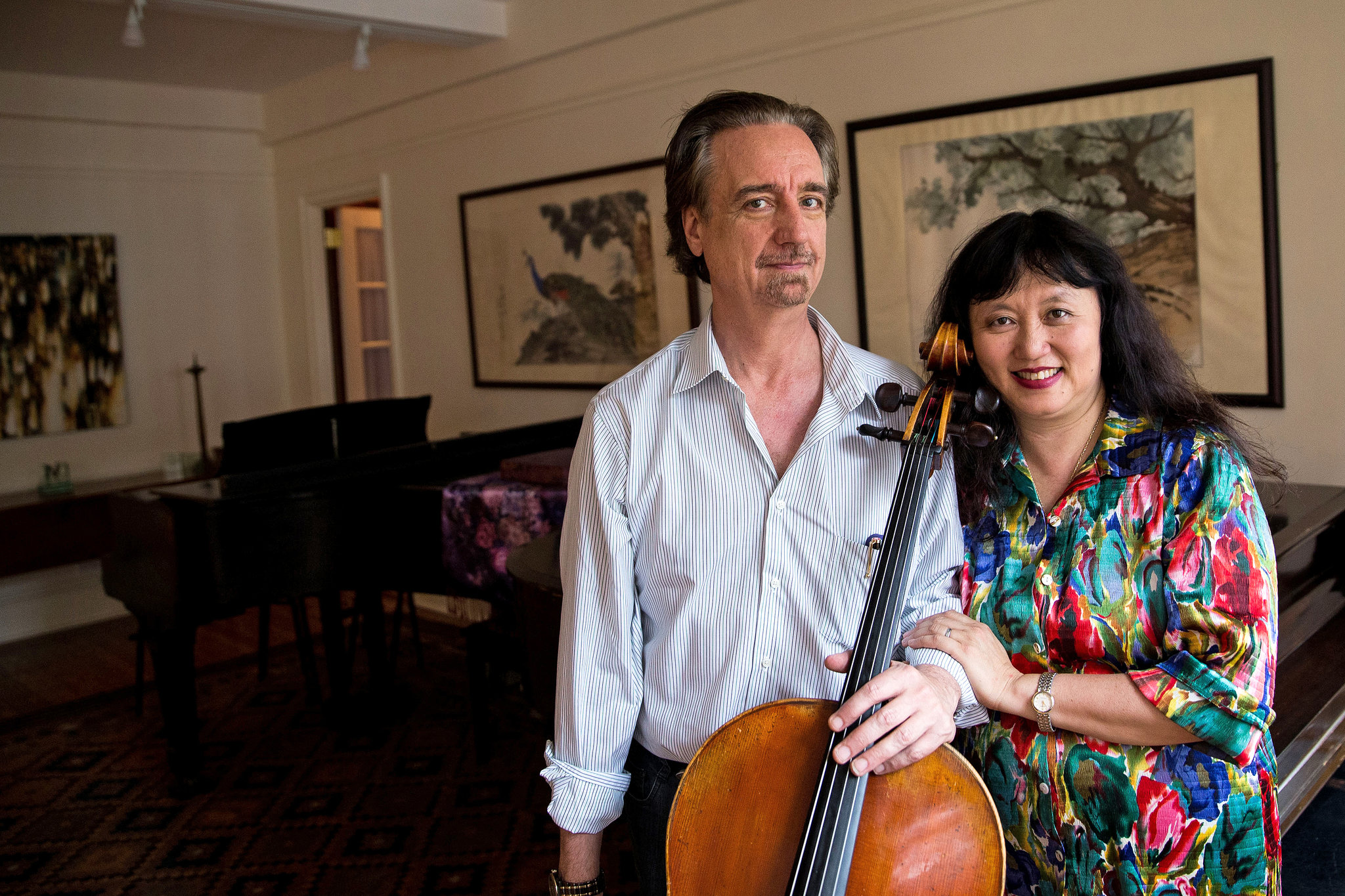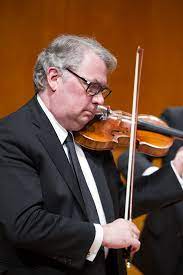by Daniel Hathaway

The first performers on the Cleveland Chamber Music Society’s calendar this season definitely qualify for re-invitable artist status. On Tuesday, September 13 at 7:30 pm, CCMS will present Wu Han, Philip Setzer, and David Finckel in a program of Schubert’s two piano trios in Kulas Hall at the Cleveland Institute of Music.
ClevelandClassical.com has conducted multiple interviews over the years with each member of the trio. Here are excerpts from conversations in March of 2010 that give some memorable insights into the lives of three touring musicians.

We began by asking cellist David Finckel about the recording of the Schubert piano trios the ensemble had just completed. What did he do to prepare for the sessions?
DF: When you’re recording a piece that is such a standard part of the repertory, you really have to feel like you’re going to do it better than anyone else did, or you’re not going to do it. So our preparation was relentless. We listened to every single recording of those pieces that I could get my hands on. And I set out to make something which would make me happier than all those other recordings.
What happens in that process is a very deep absorption of the score. It’s a kind of getting rid of or letting go of your memories of other performances or recordings. My most extreme and difficult example of that was when I recorded the Dvořák Cello Concerto. I really had to let go of the way I learned that piece from Rostropovich, who has made all the great recordings of that work. Incomparable — but when I had the opportunity to record that concerto, I had to come to grips with the fact that I was not going to make another Rostropovich recording of that piece. It had to be my own.

DH: How does it feel playing the trios after having made the recording? Do you find that anything changes?
DF: It’s absolutely wonderful because we really do know them inside out. With music this great you never stop working on it. We did a tour a couple of weeks ago and there were four or five concerts in a row, and every day before the concert we rehearsed a full two hours on the same two pieces. There are just never-ending things to discover, to improve, to perfect.
DH: Last question: how on earth do you manage your schedules between the duo [with Wu Han], the trio, and the Emerson [Quartet]?
DF: Well, it’s like watching a juggler who has four or five things up in the air. You just look at which one’s coming down and you grab it and throw it up there again. We try to approach it in an organized fashion. The reality of a concert schedule imposes a kind of structure on your life.
We couldn’t do it without our personal staff and our two excellent staffs in New York and California — that would be insane.
With pianist Wu Han

WH: It’s torturous!
DH: Now that you’ve lived with the trios for a year — between the recording and the release — how do you keep the live performances fresh?
WH: You just try to forget about the last one as quickly as possible. Actually, it’s not that hard. You could never play those pieces the same way. They have their own life on stage and I don’t think you could ever predict that. Playing with Phil and David, there’s always something happening on stage so it’s not that hard to keep it fresh. But to keep it good, that’s another story! That’s the most challenging.
DH: And you never stop rehearsing.
WH: No. Impossible!
DH: I talked with [pianist] Menahem Pressler earlier this year, and he told me that with his own trio, the Beaux Arts, they would still rehearse for three hours before a concert no matter how often they had played the repertory.
WH: I actually wrote to Menahem after our last two-week tour. I said, “Menahem, how did you do it?” And he wrote me back immediately — let me find you the email — it was the cutest thing. This guy’s never finished learning. He’s never satisfied, which is inspiring for a younger generation. Here it is. He says, “It was always difficult, but climbing the magic mountain promised always the greatest reward. Like childbirth, all the difficulties are forgotten.”
DH: How on earth do you manage your schedules between the two of you, the three of you and the four of them?
WH: With a very good travel agent — that’s very important! And also a spectacular personal assistant, who worries about everything. I admit I don’t have enough RAM in my brain — I have to save that for music, for programming — so Susan’s my external hard drive.
DH: I’m always interested in the dynamics of people who are married to each other and play and tour together. How does that work for you and David? Are you able to separate your professional and private lives?
WH: Oh absolutely — that’s the first requirement. When the music starts, your job is to serve music. I don’t really think about who’s supposed to wash the dishes when I rehearse with David. And then I think that this particular group is extraordinary. Between David and Phil there is an incredible amount of trust and a long friendship, a really sincere respect for each other’s ability, and we always have the best time. We still travel together, and we all love working — and we all love food!
DH: Food is very important when you’re touring.
WH: Oh, you bet! So that keeps us going. So where should we eat after the concert? I’m sort of worried…
DH: Thanks so much for speaking with us. I’m sorry we couldn’t all be in the same room.
WH: If you had all three of us in the same room, it could be the funniest thing.
With violinist Philip Setzer:

PS: We’re only offering the Schubert trios during two one-week periods that we know the other guys want to have off because it’s their kids’ school vacation. If I weren’t doing the trios, I’d have a little bit of a break! But it’s a great opportunity for the three of us to really get comfortable with them. They’re extremely difficult, and very uncomfortable for a lot of reasons. It’s a great learning experience for us to record them and play them a number of times.
DH: Now that you’ve lived through the recording and editing experience, how do you keep your live performances fresh?
PS: There’s no danger of these pieces losing their freshness. It’s like saying to an actor, “How do you do Hamlet eight times a week? Don’t you get tired of it?” No, with things this great and musically challenging it’s endless. You don’t feel like, “Well, we’ve got that down now, and I guess we’ll go play it a few times exactly like that and we’ll be done.” You feel each time that you’re up against something much bigger than you are, and you just try to come to terms with it and do the best you can to bring the music across to the public — that’s the main thing.
DH: Do you have any future plans for the trio?
PS: If we do more playing, it’s always going to be a limited thing. We’ll probably pick a program — or we’ll just go on playing Schubert, which is fine with me! It’s funny because the group doesn’t even have a name. We haven’t really thought about if we’re going to be an official group or a group that plays the Schubert trios. I thought we could maybe be like a chameleon — depending on the program. Right now, we’re The Schubert Trio then in a couple of years we’ll play Mendelssohn and be The Mendelssohn Trio.
Published on ClevelandClassical.com September 8, 2022.
Click here for a printable copy of this article
Return to the Front Page




